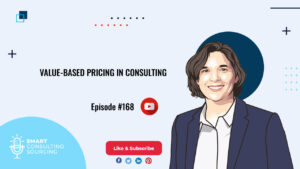Welcome back to Smart Consulting Sourcing, the only podcast about consulting procurement. I’m Helene, your guide on this journey called “How to buy consulting services like a pro.” Together, we’ll explore my insider knowledge and help you master the ins and outs of the consulting procurement world.
In today’s episode, we’ll be talking about how to find the right consulting firm for your project.
But first, let’s take a quick trip down memory lane and recap what we learned last week.
Last week we unraveled the mystery of consulting “DNA” markers and discovered how to find the perfect consulting provider for your business. We learned that it’s all about value, not just price, and that understanding a consultant’s capabilities, industry expertise, and geographic footprint is crucial.
Credibility is key, and it can come from brand recognition, thought leadership, or partner profile. We also emphasized the importance of the delivery model, culture, and seniority of your consultants. But the cherry on top was our reminder that consulting projects can be a Rubik’s Cube of cultural differences, so finding consultants who understand the local culture and language is essential.
In a nutshell, creating your consulting DNA profile and finding your match is like online dating for your business! You know what they say – it takes time and patience to find “the one,” and just like in the dating world, the first candidate you come across might not be your perfect match. So, keep swiping through those consulting firms until you find the right fit !
If you happened to miss our previous episode, we highly recommend starting there. We’re following a chronological journey through the consulting project sourcing process, so listening to the episodes in order really helps you get the most out of our insights. Don’t worry, though – we’ve got your back! You can find all our episodes on Spotify, iTunes, or YouTube for easy listening. And if you prefer to read along, the full transcripts are available in our Thought Leadership section at consultingquest.com.
So, now that we’re all caught up, let’s dive into today’s topic: finding the right consulting provider for your project.
Steps to Finding the Right Consulting Firm
Let’s be honest – finding that perfect match with the ideal “Consulting DNA” can feel like searching for a needle in a haystack. But fear not, because we’re here to guide you through the process with the help of real-life example.
Step 1: Start with Consulting DNA Markers
Imagine a small IT company based in Tunisia is looking to break into the Fintech market. So, let’s break down the six markers this IT company has identified for their potential consulting partners.
∙ First, they’re looking for capability. They want a provider with experience in market entry and growth strategy, which is crucial for their expansion into the Fintech market.
∙ Second, industry experience is key. They need a consulting firm with a broad knowledge of the Fintech industry and the ability to understand major trends, both internationally and regionally.
∙ Third, they’re considering the consulting firm’s footprint. They prefer a company based in either North Africa or Europe in order to reduce additional expenses and gain access to top-notch expertise.
∙ Fourth, budget is a concern. They have a limited budget, so they’re looking for an independent consultant or a small boutique to fit their financial constraints.
∙ Fifth, they’re focused on the delivery model. They want a high-level strategic approach that factors in both internal and external political aspects, and also provides an opportunity for their team to learn more about the Fintech industry.
∙ Finally, the sixth marker is culture. They’re seeking consultants who are fluent in either Arabic or French and have experience working in North Africa, to ensure a seamless collaboration with their team.
Step 2: Set Your Priorities
Even though we have identified our markers, we’re not quite ready to start our search just yet. Now comes the time for prioritization. Project sponsors and managers need to make some important decisions about what matters most to them. Is it skills over industry knowledge? Maybe culture over footprint? Or perhaps budget over skills?
By understanding the priority of each dimension, you’ll be able to narrow down your list of potential providers. Armed with your markers and priority levels for each dimension, you can create an “ideal Consulting DNA” profile for your project. This profile will serve as your North Star, guiding you to the right consulting firm for your unique needs.
Now that we’ve got our ideal Consulting DNA profile in hand, it’s time to start our search for the perfect consulting firm. But where do we begin, you ask?
Step 3: Perform a Quick make-or-buy Assessment
You know, it can be tempting to jump straight into sourcing external consultants, but let’s pause for a moment and perform a little make-or-buy assessment for our project. Ask yourself these questions: Can this project be done in-house? Do we have the right resources? Do we need external knowledge? Is there any confidential IP involved? Can the project be partially outsourced? These questions are especially relevant if you have internal consulting or improvement/excellence teams. Read this blog for further assistance on this topic, “ 5 Pillars of Make-Or-Buy Strategy in Consulting”.
Now that we’ve considered our internal resources, let’s move on to finding the right sources for our consulting hunt. There are several internal and external sources you can tap into. Let me walk you through them.
For internal sources, first, check if your company has a List of Preferred Providers, an internal database of consulting firms, or a curated list of firms in your field. Second, don’t hesitate to tap into your network and colleagues who have previously worked with consultants, as they might have valuable recommendations or even warnings. And finally, see if you have access to a database of evaluation reports or previous bids that could provide insightful information.
Now, as for external sources, you can start by consulting a Directory of Consulting Firms, such as the Improveo.app, which organizes firms by region, capability, and industry served. Another great idea is to read articles and books related to your field of interest, as they can often highlight leading consulting firms. Oh, and by the way, Improveo.app does that too, as they offer a curated and searchable thought leadership library.
Don’t forget to look for professional associations in your industry or the capability you need, as they might have directories or recommended firms. And, last but not least, turn to your trusty search engine—whether it’s Google, Qwant, or DuckDuckGo—to uncover even more potential consulting partners.
Step 4: Build Your Preliminary List
So, now that you’ve got all this fantastic information, what do you do with it? First of all, build a preliminary list of potential players. Keep in mind that the size of your project will impact the length of your list. For example, if you’re sourcing a mid-sized project and want to compare three potential providers, you should include roughly fifteen to twenty companies in your initial search. As a rule of thumb, expect that 30% of these companies might not have the right “Consulting DNA Profile,” while another 30% may not be available or interested in the project.
To create your list, define your search criteria based on the ideal “Consulting DNA Profile.” Let’s revisit our previous example (the FinTech project in Tunisia). You might start by casting a wide net to get a sense of the market, looking for:
∙ Small consulting firms with under 50 employees
∙ Capability in Strategy
∙ Industry focus on Financial Services or FinTech
∙ Location in Europe or North Africa
If you find that you have way too many results to process, you’ll need to increase the granularity of your criteria. But if the length of your list is consistent with your goal, you can move to the next phase: taking a closer look at each firm’s characteristics to ensure they have the right profile.
Let’s face it, many consulting firms claim they’re experts in all capabilities and industries. But their track records often tell a different story. To get a better sense of their true expertise, dig into case studies or past projects posted on their websites. For more insights into this topic, you can check with one of our podcasts, “Types of Consultancies: capabilities and specialization made simple”.
Also, don’t forget to screen their past clients: Who are they? What do they do? The background of the founders and the leadership team can also be excellent indicators of the company’s primary focus, particularly for small players.
Now, most consulting firms will detail their mission or approach in brochures or on their websites. This is where you can learn about who they are and how they do their job. Are they focusing on high-level strategy or more on implementation consulting? Do they lean more towards hard or soft aspects? Are they lifelong consultants or former executives?
All these elements will help you paint a picture of each consulting firm and determine how well they’d fit with your company.
Step 5: Spot the Firms’ Partners
We’re down to the final step in building your list of consulting firms for your project: spotting the right partners. This is crucial because you don’t want to just contact anyone at the consulting firm, especially the larger ones. You see, every partner has a unique range of skills and experience, and these can have a significant impact on your project.
Most consulting firms are organized by practices based on either industry experience or capability, sometimes even both. They might even have the leadership team listed on their website with contact information. If not, you can always turn to LinkedIn to spot the partners and check out their profiles.
Now, here’s a little secret weapon for you: thought leadership. Search for articles or white papers on the topic of your project. Most consulting firms list the names and often contact information of the authors in these documents. Double-check their current position on LinkedIn to ensure you’ve got the right company because, let me tell you, the turnover in consulting is like a whirlwind; you might be one firm behind! By doing this, you’ll probably end up adding a few more consulting firms to your list.
So, at this point, you should have a list of consulting firms that, at least on paper, have the right people with the right skills in the right place. Your next mission, should you choose to accept it, is to connect with them personally to gauge their interest and capabilities.
And with this, we reach the end of this episode. Next week, we’ll dive into how to connect with these consulting firms and assess their interest and capabilities in person, and, emphasis here, check their references. Don’t miss it!
Wrapping up
So, what are the key takeaways from today’s episode?
First, define your consulting DNA markers and prioritize them based on your project’s unique needs to create an “ideal Consulting DNA” profile that will guide your search for the perfect consulting firm.
When necessary, perform a make-or-buy assessment to determine whether your project can be done in-house or requires external consulting support.
Tap into various internal sources, such as your company’s preferred providers, consulting databases, and colleagues who have worked with consultants before. Don’t forget to check evaluation reports or previous bids for additional insights!
Utilize external sources like consulting directories (e.g., Improveo.app), articles and books related to your field, professional associations, and search engines (Google, Qwant, DuckDuckGo) to broaden your search.
Identify the right partners within consulting firms, considering that each partner has a different range of skills and experience that can impact your project. Use tools like LinkedIn and thought leadership pieces to spot partners and evaluate their expertise.
By following these steps, you’ll have a solid list of potential consulting firms that match your ideal Consulting DNA profile.
Next week, I’ll be back with even more insights to help you in your search for the perfect consulting partner. You won’t want to miss it – I’ll be sharing tips on how to connect with consulting firms, assess their interest and capabilities, and most importantly, check their references. So be sure to tune in!
Till then, stay safe and happy sourcing and if you have any questions regarding today’s topic or any consulting procurement-related topic actually, remember you can always contact me directly on LinkedIn or by email because I’m always game for a chat.
Bye and see you next week, au revoir.







